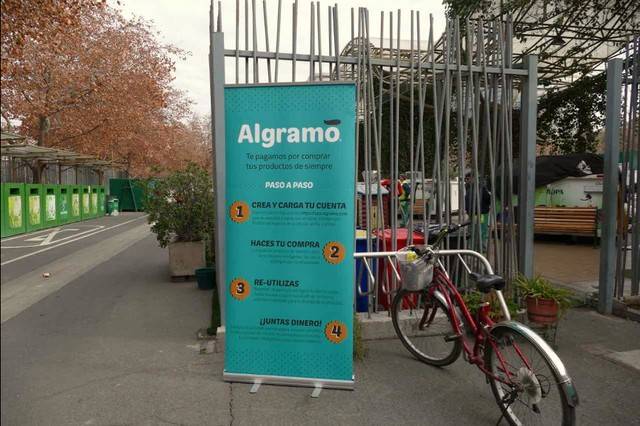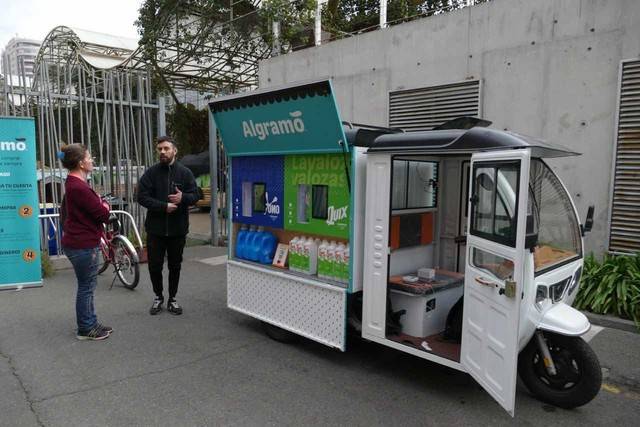Thank you for visiting the Finch & Beak website. Finch & Beak is now part of SLR Consulting, a global organization that supports its clients on setting sustainability strategies and seeing them through to implementation.
This is an exciting time for us, as our team now includes an array of new colleagues who offer advisory and technical skills that are complementary to our own including Climate Resilience & Net Zero, Natural Capital & Biodiversity, Social & Community Impact, and Responsible Sourcing.
We would like to take this opportunity to invite you to check out the SLR website, so you can see the full potential of what we are now able to offer.
Rio Mapocho in Santiago. The banks of this beautiful river, which runs through the Chilean capital, today are completely covered with plastic. Abandoned ropes, nets, but mostly post-consumer waste from bottles and flip-flops to dolls and cigarette lighters. It is in this environment that award-winning Algramo came to life. When we talk to manager Francisco Diaz, he is quick to explain that the business model of Algramo is simple but effective: “In poor neighbourhoods, local stores sell many products in small packages. This not only costs a lot of packaging material, but also a lot of money compared to larger quantities. Packaging costs can be up to 20% of the selling price of a product. In our case, the cost benefit goes to the customer.”

In the back of the warehouse, an employee sorts returned containers. She checks if the packaging and labels are still good. Full pallets with reusable bottles are sent to a local partner factory for cleaning and refilling. “Our biodegradable detergents and cleaning products therefore come in larger packages, which are also reusable. There is a deposit on the containers so they are returned and reused. It would be a real shame to dispose of these plastic containers after they have been used only once. The quality is so good that on average they can last dozens of times. And at the end of their lifespan, the material can be recycled,” Francisco says.
Predictably Algramo is not sold in the ultramodern supermarkets that are typically found in the high-end centre and wealthy neighbourhoods of Santiago de Chile. Instead, Algramo products are sold in 1,600 small neighbourhood stores in areas where poverty is high.
We step into a minimarket and are surrounded by hundreds of pre-packaged products. Indeed, many of them are come in small sizes. When we point to a bottle of Algramo detergent, the lady behind the counter confirms that customers pay a deposit for the container. When they take the empty container back to the store, they can get the deposit back. “Customers typically exchange their empty container for a full one, so the deposit they get back is like a discount on a full bottle”, she explains. She collects the empty bottles in the storage room behind the counter and returns them with the next Algramo delivery. Her example shows that it really works: every container that is returned reduces plastic waste, while customers save money.
Francisco also invites us have a look at Algramo’s newest venture. It is a collaboration with Unilever to reduce plastic waste. To see it, we head to the recycling station in the upmarket neighbourhood of Las Condes. Cleverly positioned next to the entrance is a hip, electric tricycle. The tricycle has two large tanks filled with the best-known Unilever brands of detergent and cleaning agent. On its side is a vending machine where customers can refill their empty containers themselves. The label has an RFID chip, similar to the one on subway cards. The refilling machine is activated with the chip. On a screen, customers choose how much detergent or cleaning product you want. Press ‘start’ and the container starts to be filled. On the screen you can see your new balance.
Here too, customers save money. Refilling a container is cheaper than buying a new one in the supermarket. Although the concept is still very new, during our short visit several curious customers sign up enthusiastically. “On weekdays, we drive around the neighbourhood, so you can refill your containers even more easily”, Diego explains to convince new customers.This innovative packaging method not only bypasses supermarkets, but also encourages customers to keep buying the same detergent and cleaning products.

The beer and soft drink industries have long proven that deposit schemes to reuse packaging are both useful and feasible. Unique about Algramo’s approach is that they use new technology and reuse plastic packaging in a different sector: that of detergent and cleaning products. The Chilean government does not impose a deposit on plastic containers. Still, Algramo found a business model which is based on the intrinsic value of plastic containers. Its result: less plastic waste potentially ending up in nature and cost savings for customers. After all, be it at the neighbourhood store or at the refill tricycle, the economic benefit of reusing the packaging is passed on to the customer. This, in turn, leads to increased customer loyalty and repeat purchases.
Algramo cleverly fights both social inequality and plastic pollution. Which company is next to adjust its packaging proactively without waiting for the legislator to impose a deposit scheme? And which customers will help to make these types of initiatives a success? There is no time to waste in the complex battle against plastic pollution.
In case you are interested in creating your own circular economy solutions, download our circular economy sprint paper to find out how or send a mail to Johana Schlotter at johana@finchandbeak.com for more information.
Sailors for Sustainability is formed by Dutch sailors Ivar Smits and Floris van Hees who chronicle their sailing trip around the world in search of sustainable solutions and examples of circular economy thinking. The goal is to inspire their followers with positive cases while raising awareness of the urgency of sustainable change. Using renewable energy sources such as wind and solar energy, they travel sustainably. Finch & Beak is involved as a partner of the project to share the insights gained by Sailors for Sustainability to inspire sustainable business transformation.
Image source: Algramo, Facebook
Finch & Beak
hello@finchandbeak.com
+34 627 788 170